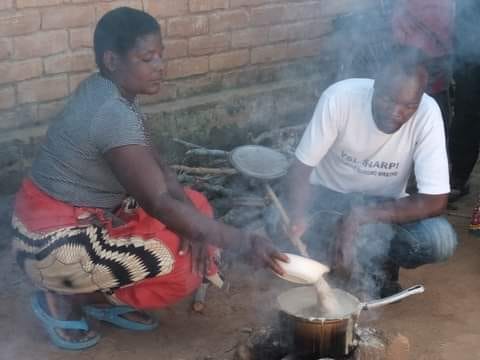Women's Hope for Change Transforms Nutrition Landscape in Malawi's Mchinji District
Through the "Supporting Nutrition Integrated Components" program, Women's Hope for Change empowers women to combat malnutrition and improve child health in Mchinji district.
MCHINJI, Malawi – For years, Malawians have grappled with food scarcity, leading to a rise in malnutrition cases, particularly among children, writes Gerald Fanuel.
However, in a significant intervention in Mchinji district, Women's Hope for Change has achieved remarkable progress in improving nutrition levels among children in Nyoka and Kachinga villages under Traditional Authority Nyoka.
This year alone, 35 out of 42 children from these villages have successfully recovered from malnutrition.
The programme, titled "Supporting Nutrition Integrated Components," has been funded by Focus for Health and was launched in 2016 in the three villages of Ntondo, Kangwere, and Mgalimo in T/A Nyoka of Mchinji district.
At that time, the area reported 207 cases of malnutrition.
The initiative aimed to train women in Paediatric Deficiency Health, equipping them with the knowledge and skills to prepare nutritious meals for their children using locally available resources.
Pilirani Phiri, one of the beneficiaries, praised the programme for its transformative impact on the community.
"The programme has made a huge difference in our community. We had the resources but used them wrongly, resulting in a significant number of malnourished children," Phiri said.
She revealed that her four-year-old child, previously diagnosed with malnutrition, has now regained health and no longer relies on nutritional supplements.
Phiri also commended the project for training the women on establishing backyard gardens and producing organic fertilisers, which have contributed to increased harvests.
"Through the project, I have learned how to create backyard gardens and make organic fertilisers, enabling us to have enough food despite the rising costs of commercial fertilisers," she added.
According to a joint report by the Food and Agricultural Organisation (FAO), International Fund for Agriculture Development (IFAD), United Nations Children's Fund (UNICEF), the World Food Programme (WFP), and the World Health Organisation (WHO) on the state of food security and nutrition in the world, approximately 3.1 billion people could not afford a healthy diet in 2020.
This represents an increase of 112 million people compared to 2019, reflecting the inflation in consumer food prices.
Despite hopes of emerging from the COVID-19 pandemic in 2021 and improving food security, global hunger has further intensified.
In Southern Africa, where Malawi is located, the prevalence of undernourishment stands at 9.2 percent, three times higher than the target agreed upon in 2015 during the launch of Sustainable Development Goal (SDG) Target 2, which aims to eradicate malnutrition in all its forms.
In an interview with AfricaBrief, Hellen Makukula, the Executive Director for Women's Hope for Change, explained that the program's objective is to eradicate malnutrition by teaching people how to prepare complete meals encompassing all six food groups, utilizing locally available resources.
"The programme is aimed at eradicating malnutrition by training women how to prepare a complete meal with all six groups of food using locally available resources," Makukula revealed.
Makukula further disclosed that since the project's inception, over 476 malnourished children have benefited from the programme.
Cassius Mkandawire, the Mchinji District Nutritionist, praised the initiative for its significance in children's growth, highlighting the reduced burden on the government as the number of malnourished children in the area has decreased.
However, Makukula acknowledged the challenges that the programme encounters, primarily related to resource scarcity among the women due to prevailing poverty.
During the program's orientation phase, some women are unable to bring food due to household challenges, placing additional strain on available resources.
Makukula explained, "But we organised the villages to have village grain/food banks to support the children and elderly with foodstuffs."
In response to resource constraints, Women's Hope for Change has actively collaborated with the communities to establish backyard gardens and implement low-cost fertilisers.
These efforts aim to increase the availability of essential food items such as maize, vegetables, fruits, and bananas.
Looking ahead, the organisation is planning to expand its interventions to other villages within the district.
By extending its reach, Women's Hope for Change hopes to benefit as many children as possible and continue their mission of eradicating malnutrition in Mchinji district.
While the programme has encountered obstacles, the commitment and dedication of Women's Hope for Change remain steadfast.
With continued support and resource mobilisation, they strive to overcome these challenges and make a lasting impact on the nutrition landscape of the region.



